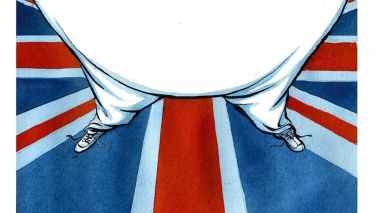The trouble with writing about people is their friends. Back when woolly mammoths roamed the earth and I was Crossbencher in the Sunday Express, I wrote admiringly about the burgeoning prospects of a young MP. He was of Dutch origin and I suggested that he might become the first Hollander to lead the British Labour party. A friend was drinking in Annie’s Bar in the Commons two days later and overheard another MP congratulate my subject. ‘Nice article about you in Crossbencher, Dick.’ ‘Yes,’ he replied, smiling modestly. ‘Don’t know what I did to deserve that.’ A little later in came another colleague. ‘Oh, Dick, I’m so sorry about that vicious piece about you in the Express.’ ‘Vicious? How do you mean?’ ‘Oh, don’t you see? The whole thing was got up to ruin your chances, pointing out to everybody that you are a foreigner.’ ‘Oh, my God, you’re right, what a sod that man Oakley is…’
I tell the story because broadcaster, author and former professional jockey Brough Scott has just written a brilliantly sensitive, balanced and authoritative book about top trainer Sir Henry Cecil only to have his subject condemn it publicly and refuse all co-operation. Having myself penned two trainers’ biographies and a book on Lambourn’s racing community with portraits of many others, I have total sympathy with Brough. The subjects themselves are usually fine, acknowledging that there have been mistakes and misjudgments in life as well as the successes you are helping them to celebrate.
It is only when their nearest and dearest start looking at the material that the trouble arises: ‘You can’t let him say that about you.’ In one case, I remember working relations were almost sundered because I quoted a diary column cutting, which they had pasted in their family scrapbook. I fear something similar has happened in Henry Cecil’s case and it is a tragedy because there is no greater achiever and no more interesting man on the racing scene than the trainer not just of Frankel but also of 24 other Classic winners, and Brough’s book is one that does him justice.
Of course it mentions Cecil’s marriage break-ups, his frolics in a wastrel youth, the financial shenanigans that resulted in Lester Piggott going to jail for tax-dodging — no honest author could have done anything else — but they are placed in context and given no more than appropriate weight. What we have is a gem of a book that charts how an ineffectual youth became a hyper-achieving adult and does much to explain the dandyish enigma that is Henry Cecil, with his mixture of patrician hauteur and self-deprecation, his angst and insouciance, his almost feminine charm and his utterly masculine drive and authority.
Racing enthusiasts will read the book above all to seek what makes ten times champion Cecil such an incredible trainer of horses such as Oh So Sharp and Bosra Sham, Buckskin and Reference Point, Le Moss and Diminuendo. They won’t be disappointed. Cecil took advice early on from his first wife Julie’s father Noel Murless, who told him, ‘Your horses are galloping like a lot of old gentlemen. You must make them work.’ From then on, the Cecil horses were worked harder and faster at the start of their galloping than any others in Newmarket.
Cecil gives massive attention to pairing horses with the right work-riders and one of the most telling quotes in the book comes from Paddy Rudkin, a key figure for so long at Warren Place: ‘He doesn’t clutter his brain up with other responsibilities, but all the decisions on how much work a horse should do and who should ride what, he takes. He’s gifted. He gets ahead because he is a greedy, ambitious man. We always get our horses very fit, they canter faster, work faster than others at Newmarket.’
But there is more than that, a kind of magic in the touch and Brough gets across Cecil’s quite extraordinary affinity with the thoroughbred racehorse. With his big hands on her neck and a couple of endearments he can calm a filly who is beside herself in a tantrum. He senses ability in an animal long before others have seen it. As a rider, Brough is a little more sceptical of the way Cecil insists that he goes and chats to his horses as his friends. Horses, the trainer insists, have more nobility than humans and are without jealousy or greed. They may sulk if they lose but they don’t take it out on anyone or become snobby when they’ve won: ‘Basically they are my friends and they help me. I think it’s terribly important that you have a feeling towards them. There must be a rapport, an empathy between man and beast.’
He used to exercise his horses in chocolate-bar formation ‘so they can talk to each other’. That ended one day when one filly went wild and they scattered to the winds. Remonstrating with the original rider, he was disarmed by the retort: ‘Your f***ing chocolate bar just melted.’ I hope Cecil melts, too. Brough Scott can be proud of this book. Henry Cecil should be, too.





Comments